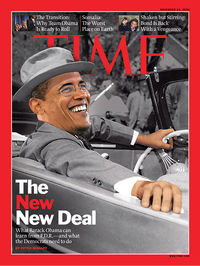Think of this as Volume 18, Number 45 of the newsletter I have written weekly since March, 1997. Enjoy.

That makes sense when you understand the Obama Thesis of Consensus, which I first wrote about under that name almost six years ago but had been describing, under other titles, for almost three years before that.
Consensus implies that people come to agreement, despite sharp disagreement. If consensus is what you’re looking for the last six years have been a complete failure. Republicans continue to play politics based on the Nixon Thesis of Conflict , and most Democrats today want to play the same game.
Which leads me to this startling conclusion. Barack Obama threw the mid-terms.

Contrast the Obama record after six years with what his predecessor had at the same time, and there’s no comparison. Yet the President refused to blow that way. As a result, Democrats deserted him. He became as unpopular as George W. Bush was in 2006, over issues like the NSA, enforcement of the Patriot Act, and net neutrality. The party deserted its leader and paid the price.

On the one hand Republicans could cooperate with the President and get compromises passed. This will upset their base as much as that of the Democrats, and the President will wind up with most of the credit.
Or Republicans can try to force the President’s hand, becoming ever-more extreme and out-of-touch with the way Americans feel on a whole host of issues. This practically guarantees that Obama’s successor will be a Democrat, and it’s the Presidency – nothing else – that is the prize.
As I’ve said before, every crisis period recapitulates parts of the crises that came before. Our present politics has things in common with 1974, with 1938, with 1902 and with 1866. In all these cases the proximate cause of the crisis seems to have passed. But the real change is still hidden from view.


The real conflict of our time is not between left and right, but between confrontation and conciliation, between absolutes and muddling through, between the processes of war and peace. The heart of the Obama Thesis of Consensus is a call for peace, for reasoning together, for compromising, for getting along. It’s that which seems to have no constituency.

After 1938, Franklin Roosevelt moved toward confronting Hitler with no cooperation from the Congress, which after that year was completely controlled by a coalition of Republicans and southern Democrats. What he had were diplomacy and the propaganda tools of the radio and movies. He had to find a way to convince the country to confront its real threats, and he did.
That’s precisely the situation that Barack Obama finds himself in now, and I think deliberately. All the policy initiatives are aligned. Most Presidents become more popular near the end of their terms than they were earlier. Bush was actually more popular in 2008 than in 2006, despite the Great Meltdown. Clinton left office wildly popular, and Reagan was popular enough to name his own successor.

What matters most to a generational thesis is that it’s validated by events. Not just domestic political events, but by economic events, social events, and global events. And not just over a day or a month or a year but decades, lifetimes. The fact is that the world is becoming more peaceful, that millions keep entering the global middle class each month, defusing the population bomb. The fact is that renewable energy is now ready to stand on its own, defusing the climate bomb. The fact is that health care policy is prepared to reduce the percentage of GDP going to health care, defusing the fiscal bomb.
What America will most want in 2016, and what it will assuredly deserve, is a raise. As unemployment continues to decline, pressures for higher wages will increase. As deflationary pressure increases the need for new money coursing through the economy will also increase, and it makes a lot more sense at this point to give that money to people than to bankers, something even bankers are coming to realize.
So you hand Republicans the bridge, and you let them try to steer the ship onto the rocks, despite the presence of clear water ahead. They come to look ridiculous. They can either agree to the new course or stand for the stupid in the face of overwhelming evidence that stupid is, well, stupid.
So we get some small agreements, which upset the Republican base. And the ship keeps heading toward clear water. And the American people validate the new course.
But could that plan have worked had Democrats won the midterms?
No.









